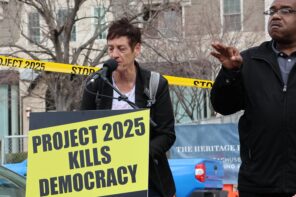President Trump’s chief strategist, Steve Bannon, famously expressed his admiration for “darkness” and the devil, linking former Vice President Dick Cheney and Star Wars villain Darth Vader to a more traditional personification of the dark side: “Satan. That’s power. It only helps us when they get it wrong. When they’re blind to who we are and what we’re doing.” More recently, in pursuit of this vision of power, Bannon declared media to be “the opposition party” and said that the press should “keep its mouth shut and just listen for a while.”
Bannon’s admiration for Satan—a Satan imagined in the vein, surely, of Milton and Blake, the rebel against the establishment who has power via devotion to his own will, his own self—finds manifestation in this call to gag the press. Bannon, of course, chastises the media as a long-time competitor who provided his own alt-media in the form of Breitbart, and his desire for restrictions on a free press emerge from his own sense of being an embattled underdog against a mainstream or “establishment” media—rebelling against it much as Satan rebelled.
Yet there’s more to Bannon’s invocation of Satan than that. Bannon’s Satan isn’t merely a misunderstood figure or heroic rebel. There’s no note of hidden or misinterpreted goodness here; no rectitude somehow wrapped up in this image of Satan. Indeed, this is why such admiration of Satan—from a man who has the ear of and is drafting policy for the President of the United States, a man now sitting on the National Security Council potentially in violation of federal law—is worthy of attention and analysis. Put bluntly, the only thing valorized about this Satan is power.
The dark power Bannon envisions is that of Satan as the Prince of Lies, sovereign via control over what counts as truth. As Thomas J. Whitley has written, within Bannon’s framework “The fight for real power is over what gets to count as a fact in the first place. Truth only matters insofar as you have the power to determine what is truth.”
Such is the post-truth world, the world of alt-facts. Many technological and social changes have led to the possibility of this situation, from the rise of the 24-hour news cycle and the collapse of the newspaper industry, to the blurring of news and entertainment. As Emily Nussbaum observed in a remarkable article, “all news-like items feel fungible.”
In addition to enabling burgeoning publication platforms largely lacking in any editorial oversight and facilitating physical disconnect and emotional detachment, internet technologies have allowed those of like mind (however obscure and esoteric their like-mindedness) to communicate and build communities reinforcing their own beliefs, leading to what Michelle Kuo call “the spectral atomization of disinformation” online.
The power of Bannon’s Satan resides in illusion, or in keeping his audience trapped in illusion, with no bearing on the really real, no sense of a reality outside the lies, the propaganda, the devil’s version of “truth.” This Satanic power thus depends on a lack of discernment, a loss of grounding. In such a setting, one could never “fact-check” or, to eschew the euphemism, one could never figure out if a claim were verifiable or merely belief; accurate, a lie, or a matter of faith.
We would not be able to confirm, to deny, or to recognize the possibility of confirming or denying those thousands of Muslims President Trump repeatedly insists he saw cheering in New Jersey as the Twin Towers fell, for instance. Likewise, we’d have no recourse but to take the President at his word that two people were shot at a political event in Chicago, or that a protestor at one of his own rallies was actually an agent of ISIS.
When commentators on the right cautioned, during the campaign, that Trump’s statements should be taken seriously but not literally, they were laying the groundwork for the birth of alt-facts out of a language of hyperbole which was simultaneously a language of smokescreen and plain-spoken statements that could always be partially retracted as exaggeration, as rhetorical flourish. This was Trump’s answer to the sort of consummately Machiavellian language of career politicians like the one he campaigned against.
Compare, for instance, Trump, on the Access Hollywood tape, bragging of “grabbing” the sexual organs of women, using crude but clear language, with that equally infamous statement from President Clinton, “I did not have sex with that woman,” turning to nuance to obfuscate, deploying seemingly precise language to permit an alternate precision. Clinton’s statement, at least, existed in the world of facts; it was disconfirmed in detail in a special prosecutor’s report.
Alt-facts thus have a privileged place in politics, where they not only continue a trend of outrageously gymnastic engagements with the spoken word but also of eschewing the tangled language of politics for plain talk. Where alt-facts prove more devilish than old-school lies, even the cleverly concealed ones, is in their abandonment of reality altogether, their leap from the verifiable to the realm of pure belief.
Untethered from their own verifiably false nature, claims such as Obama’s supposed devotion to Islam, his barring of Christian refugees to America, or those crowds of cheering Muslims on 9/11 all function, for those who accept them as alternatives to facts, to reinforce beliefs. Verification is beside the point. This approach to reality is seen in other places. Certain satire functions this way, for instance, as do miracles. The Onion snidely echoing Joe Biden’s disdain for the incoming administration or the appearance of a stain on an overpass wall that is read, by devotees, as a manifestation of the Virgin Mary. Belief is bolstered; confirmation or even confirmability is, simply, moot.
As any student of religion knows, not all beliefs conflict with objective reality in the same way: the belief in life after death, for instance, does not carry with it the same this-worldly consequences and conflicts as the belief that one can walk through walls. We fall for the trap of Bannon’s brand of Satanic power if we believe that the statements about Muslims in New Jersey or illegal immigrants throwing the popular vote are merely matters of belief. Rather, these are claims about objective reality in the world which can be confirmed or denied, proven to be accurate or lies.





